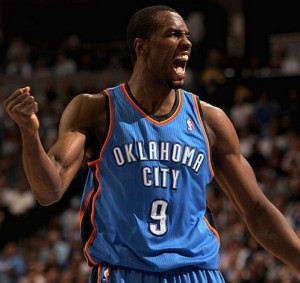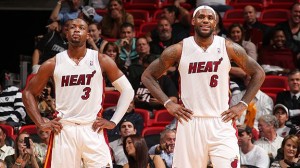 The NBA conference finals normally bring out the best that the game of basketball has to offer.
The NBA conference finals normally bring out the best that the game of basketball has to offer.
More often than not, the four best teams remain, and if we’re lucky, the best players on the planet.
We are treated to some combination of LeBron James, Kevin Durant, Russell Westbrook, Dwyane Wade, Tim Duncan, Tony Parker, Manu and Paul George every night. These players give us performances to praise night in and night out.
And sometimes they don’t.
And it’s when they don’t that we get nasty. Somebody is to blame. And with so few other games to focus on, they get the brunt of the attention. That goes for players and coaches.
So as we prepare for a critical Game 4 Tuesday night in Oklahoma City tonight between the Spurs and Thunder — we are due for a thriller, right? — let’s check the pulse of each series. Here’s more from the new go-to for everything Thunder at ESPN, Royce Young:
Since winning NBA Coach of the Year in 2010 after leading a group of 20-year-olds to 50 wins and a postseason berth, Brooks has steadily seen his reputation drained to a punch line. He’s ripped for his commitment to veterans such as Perkins and Derek Fisher. He’s ripped for the Thunder’s frustratingly simple offense. He’s ripped for not getting more out of two outrageously talented superstars.
But I can’t shake what Durant said during his MVP speech.
“I’ve never met anybody like you, so selfless,” Durant said to Brooks. “You don’t take the credit for nothing, even though you deserve all of it.”
Take Game 3 of the Western Conference finals against the Spurs. The Thunder stormed their way to an emotional 106-97 win, and the prevailing storyline was Serge Ibaka’s return (and rightfully so). They appeared fixed and whole again. But within that was Brooks’ shrewd move to add slashing guard Reggie Jackson to the starting five, putting more defensive pressure on the Spurs, opening up weakside options and more driving opportunities for Westbrook and Durant.
Down 2-0 and being outscored by 50-some points and getting just nine total from three starters in the first two games, Brooks had no choice but to make a move. He got Serge Ibaka back which was huge on both ends of the floor. Ibaka came out and shot 4-4 right out of the gates, and provided rim protection on the other end that completely altered the game.
But it wasn’t just Ibaka that made the difference. It was the move that Brooks carefully and tactfully decided to make – inserting Reggie Jackson into the starting lineup.
Jackson played well in front of the home crowd, tallying 15 points and provided another threat on the offensive end for the Spurs to worry about, taking some much needed attention off of Kevin Durant and Russell Westbrook, who noticeably played without such weight on their shoulders.
The return of Ibaka and the insertion of Jackson gives the Thunder four legitimate threats on the offensive end as opposed to just two in Durant and Westbrook.
It’s a whole new ballgame.
“It’s a major decision,” Brooks said Monday on switching his starting five. “We’ve been successful. I get knocked as a coach that we don’t make changes. … We’ve won a lot of games [with that starting five]. But there’s times that we have to change in a series. I think our guys have adjusted well the last two times we’ve done it. We might have to do it again.”
Not only was the new starting five electric (150.4 points per 100 possessions), but Brooks handed mainstay Sefolosha a DNP-CD. How’s that for bold?
Brooks definitely has his faults, though. The Thunder sometimes appear like a team that’s just winging it, trying to get by on raw talent, rather than having any semblance of a plan. The offense often teeters between best-in-the-league and oh-my-goodness-what-are-they-doing. Their half-court attack dissolves into a mushy mess, and the defense is maddeningly inconsistent. Many of their big shots come in transition or as Hail Marys off broken plays. And if well-conceived stuff is being drawn up in the huddle, it rarely seems to make it onto the floor after a timeout.
Tuesday night’s Game 4 will go a long way in determining the value of Brooks’ decisions. Is this something the Thunder can rely on going forward? And if so, what decisions will they have to make this offseason?
That’s not something they are concerned with today, though.
All that matters is avoiding an elimination game in San Antonio on Thursday.
You can bet Scott Brooks has his fingers crossed.
 The Pacers find themselves outmatched vs. Miami
The Pacers find themselves outmatched vs. Miami
Here’s a simple standardized test question for you:
The Indiana Pacers are to the Miami Heat as the ____ are to the Los Angeles Lakers?
The correct answer?
The Sacramento Kings.
You remember those epic battles between the Kings and Lakers. Those pesky Kings battled the Kobe and Shaq Lakers to the brink. They took the No. 1 seed and home court advantage. 2002 was going to be the year.
But the Lakers were too much. They had the star power, the will, the discipline, and all those great veteran role players to hit big shots. Game 7 came around and the Kings just couldn’t pull it off.
Well, that is starting to sound like this Indiana Pacers team, who now trail the Heat 3-1 heading back to Indy for a must-win Game 5. Will they only be remembered as a part of another teams story? Grantland’s Zach Lowe has more:
The Pacers are young, but they appear to have reached their ceiling as the only Eastern Conference team able to mount a consistent year-to-year challenge to Miami’s greatness. The Heat destroyed Indiana over Memorial Day weekend, dominating on both ends of the floor, and they now stand one win away from their fourth consecutive trip to the Finals — a feat no team has accomplished since the 1980s Celtics.
If the Heat take that step, it will be tempting to paint the Spurs or Thunder as their long-term rivals. But this whole time it has really been Indiana. The Pacers have been the foil in many of the shifts that have defined Miami’s evolution, and they even forced some of those changes through their own grit, size, and smarts. “It has been such a fun rivalry,” said Donnie Walsh, the Pacers’ longtime personnel man. “The stakes are always so high, especially for us, since we’ve never won. We had our eyes on each other during the regular season, and I think it nearly killed both of us.”
But why are the Pacers falling so miserably short right now during the series they knew was the only one that counted all along? Lowe believes it is all about defense:
The Heat have held the Pacers’ offense in check since Game 1, and they defend Indiana in a style that would have been unfamiliar to the Heat of 2011 and 2012. Those Heat blitzed everything, trapping point guards out toward midcourt on the pick-and-roll and rampaging around the floor like uncoiled sprinters.
The change has neutered the Pacers’ pick-and-roll attack from the center of the floor in three consecutive Heat wins. The Pacers have no one who can turn the corner, and without a hard trap to exploit, the Pacers’ ball handlers have too often just dribbled aimlessly toward the sideline. That is death against Miami, which feasts upon weak cross-court passes. Indiana’s huge lead in Game 3 vanished under an avalanche of turnovers along the right sideline. “You just gotta tip your hat to Spo [Erik Spoelstra] for that,” Hill told me at shootaround on Monday. “He changed the way they defend us.” Hill said he took no pride in forcing a concession from the champs.
There are several other reasons that the Heat dominated the Pacers these last three games but I won’t spoil that for you. Lowe dives deep into the X’s and O’s as he always does. One particular point I would like to point out, though, comes from Dan Le Batard of ESPN and the Miami Herald. Le Batard is as plugged into the Heat as anybody, and always is able to read the pulse of the team.
He believes trust is the reason these Heat have made it this far (again), and while LeBron James isn’t going anywhere:
But a possible return to Cleveland is what we talked about because, well … because. But, when it comes to James and his decision-making, something deeper and more meaningful happened that very same night. Closer to the winning. On, you know, a court. In, you know, a playoff game. The kind of game James has been winning again and again since leaving Cleveland, and the kind Cleveland hasn’t participated in since James left, which is why the Cavs keep getting those first overall picks that trigger the national clucking about whether he’ll return.
It was late against the Pacers in Game 2. Miami was down and in danger. Lance Stephenson was, according to Jeff Van Gundy, the best player on the court during a sizzling third quarter. The angry noise that has consumed this Miami franchise for four years — a noise that has been quieter than it has ever been since Game 7 of last year — was about to return. Amid this, James told Spoelstra to put Norris Cole on Stephenson. It was an unconventional move. Cole hadn’t been very good for Miami this postseason. But Spoelstra listened. And never mind scoring again. Stephenson didn’t get inside the three-point line with the ball after that. Miami has cruised since.
“When he comes to me with something, an idea, of course I listen,” Spoelstra says. “Come on. When the best player in the world is coming to you? Our communication has been much better. I was certainly much more stubborn our first year, and he would probably be first to admit that he was much more likely to want to change things immediately if things weren’t going well. So we’ve found a common ground where there’s a give and take and much more communication about decisions.”
Ben Baroff is a basketball journalist who blogs for SheridanHoops.com. Follow him on Twitter here.